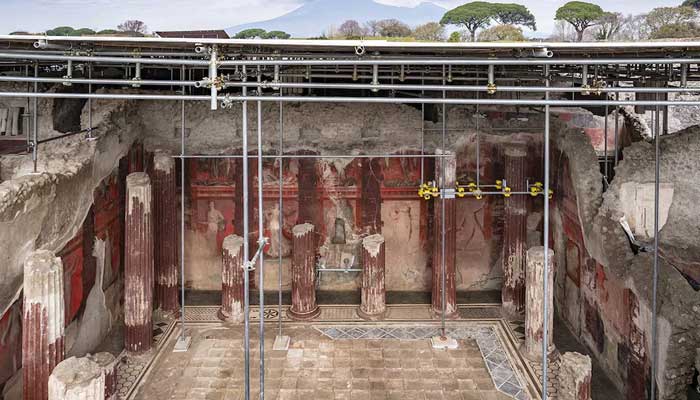Archaeologists in Pompeii have uncovered rare, nearly life-sized frescoes that offer fresh insight into religious practices in the ancient city before it was destroyed by Mount Vesuvius in AD 79, the site said on Wednesday.
The discovery features a large-scale frieze that spans three walls of a banquet hall, presenting vivid imagery of the initiation rites for followers of Dionysus – the ancient Greek god of wine, fertility, theatre and religious ecstasy.
The initiation rituals, known as the Mysteries of Dionysus, were secretive religious rites dedicated to the god, promising spiritual enlightenment and possibly a blessed afterlife.

The fresco, dating to 40-30 BC, presents vivid imagery of Dionysian followers in states of ritualistic ecstasy, dancing and hunting, resembling the frescoes of the nearby Villa of the Mysteries which were uncovered 100 years ago.
“In 100 years’ time, today will be remembered as historic because the discovery we are presenting is historic,” said Italian Culture Minister Alessandro Giuli, who attended the unveiling of the frescoes.
“Alongside the Villa of the Mysteries, this fresco forms an unparalleled testament to the lesser-known aspects of ancient Mediterranean life.”
The giant frieze illustrates the female followers of Dionysus as both dancers and fierce hunters, carrying a slaughtered goat on their shoulders or holding a sword and the entrails of an animal in their hands.
At the centre, is a fresco of an elegantly dressed woman who is possibly waiting to be initiated into the mysteries.
An upper frieze depicts live and sacrificed animals, including a fawn, a freshly gutted boar, roosters, and fish. Researchers said this juxtaposition underscored the dual nature of Dionysian worship, combining revelry with primal sacrifice.
“The question is, what do you want to be in life, the hunter or the prey?” said the director of Pompeii, Gabriel Zuchtriegel.


